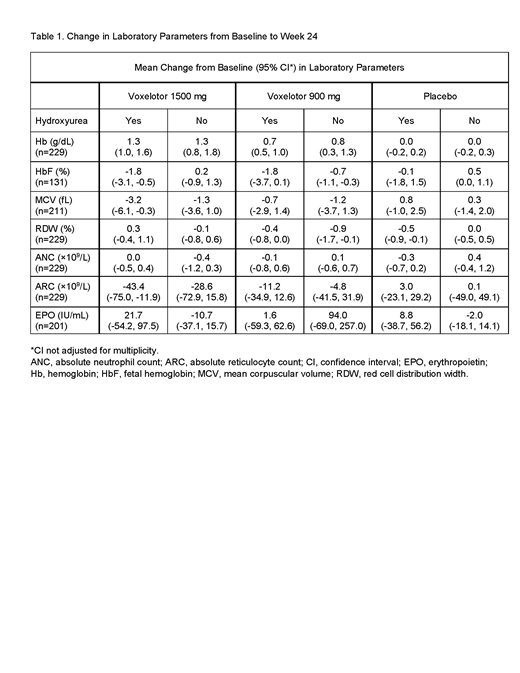Background: Sickle cell disease (SCD) is a chronic, debilitating disorder caused by a mutation in beta globin, which leads to the production of sickle hemoglobin (HbS). Deoxygenated HbS polymerization results in red blood cell (RBC) sickling, which leads to anemia, hemolysis, vaso-occlusion, and organ damage. Voxelotor a first-in-class therapy in development for the treatment of SCD, stabilizes HbS in the oxygenated state and has been shown to reduce anemia and hemolysis. Hydroxyurea induces fetal hemoglobin (HbF) and is an FDA- and EMA-approved treatment for SCD. Because both voxelotor and hydroxyurea can affect anemia and hemolysis, and potentially have additive mechanisms of protection against HbS polymerization, the effects of concomitant hydroxyurea in the setting of voxelotor treatment were investigated. The objective of this analysis was to evaluate RBC parameters, such as hemoglobin (Hb), mean corpuscular volume (MCV), %HbF, absolute reticulocyte count (ARC), and red cell distribution width (RDW), as well as the absolute neutrophil count (ANC) to examine the potential impact of concomitant hydroxyurea use on the effects of voxelotor and on medication adherence during the treatment period. Serum erythropoietin (EPO) levels were also monitored to investigate the effects of increased Hb concentrations on oxygen delivery.
Methods: The HOPE study is a phase 3, randomized, placebo-controlled, double-blind, multicenter study comparing the efficacy and safety of voxelotor (1500 mg and 900 mg daily) versus placebo in participants aged 12 to 65 years with SCD. A per-protocol analysis was performed using available data for all participants at the interim data cutoff on October 31,2018. Concomitant hydroxyurea treatment was permitted per protocol if the dose was stable at enrollment and maintained, unless dose adjustments were required due to toxicities. Laboratory parameters were compared in participants with or without concomitant hydroxyurea use.
Results: From the HOPE study, 274 participants with lab values for the specified parameters (Hb, MCV, %HbF, ARC, RDW, ANC, EPO) available through week 24 were analyzed. A total of 179 of 274 (65%) participants were receiving hydroxyurea at study enrollment, and they were evenly distributed across the 3 treatment arms. Baseline lab values documented the effects of current hydroxyurea treatment, with higher average Hb, MCV, and %HbF but slightly lower average ARC and ANC compared with those not receiving hydroxyurea. Voxelotor treatment led to significant dose-dependent Hb increases, regardless of concomitant hydroxyurea therapy (Table 1), but the average MCV, %HbF, ANC, and RDW were unchanged. A lower average ARC was noted, which was attributed to the increased Hb level, whereas EPO levels showed wide variability but no significant changes from baseline.
Conclusions: The HOPE study demonstrated that voxelotor treatment increased Hb levels in study participants with SCD, irrespective of hydroxyurea use. Significant voxelotor-associated Hb increases were observed for participants on stable-dose hydroxyurea and were equivalent to those observed in participants not taking hydroxyurea. The lack of observed changes in MCV and ANC was consistent with stable hydroxyurea exposure throughout the treatment period, thus addressing questions about potential changes in hydroxyurea compliance during the study. The additive treatment effects on anemia and hemolysis by voxelotor suggest that combination therapy with hydroxyurea may be safe and effective for optimal disease modification.
Ware:Addmedica: Other: Research Drug Donation; CSL Behring: Membership on an entity's Board of Directors or advisory committees; Novartis: Other: DSMB; Nova Laboratories: Membership on an entity's Board of Directors or advisory committees; Global Blood Therapeutics: Membership on an entity's Board of Directors or advisory committees; Agios: Membership on an entity's Board of Directors or advisory committees; Bristol Myers Squibb: Other: Research Drug Donation. Brown:Novartis, Inc: Research Funding; Imara, Inc: Consultancy, Research Funding; Global Blood Therapeutics, Inc: Consultancy, Membership on an entity's Board of Directors or advisory committees, Research Funding; Pfizer: Research Funding. de Montalembert:bluebird bio, Inc: Consultancy, Honoraria, Membership on an entity's Board of Directors or advisory committees; AddMedica: Consultancy, Honoraria, Membership on an entity's Board of Directors or advisory committees; Novartis: Consultancy, Honoraria, Membership on an entity's Board of Directors or advisory committees. Tonda:Global Blood Therapeutics: Employment, Equity Ownership. Tong:Global Blood Therapeutics: Employment, Equity Ownership. Hoppe:Novartis: Consultancy; Bioverativ: Consultancy; Global Blood Therapeutics: Employment, Equity Ownership; Imara: Consultancy. Lehrer-Graiwer:Global Blood Therapeutics: Employment, Equity Ownership. Abboud:Novartis: Consultancy, Honoraria, Research Funding; GBT: Honoraria, Membership on an entity's Board of Directors or advisory committees, Research Funding; AstraZeneca: Membership on an entity's Board of Directors or advisory committees, Research Funding; Modus: Research Funding; Novo Nordisk: Consultancy, Honoraria, Membership on an entity's Board of Directors or advisory committees; Eli Lilly: Research Funding; Amgen: Other: Travel support; CRSPR Therapeutics: Membership on an entity's Board of Directors or advisory committees.
Author notes
Asterisk with author names denotes non-ASH members.


This feature is available to Subscribers Only
Sign In or Create an Account Close Modal